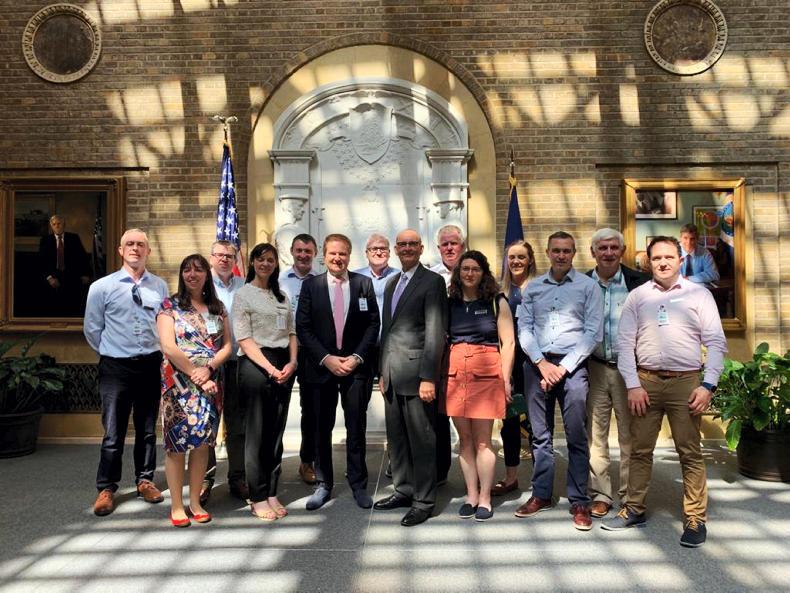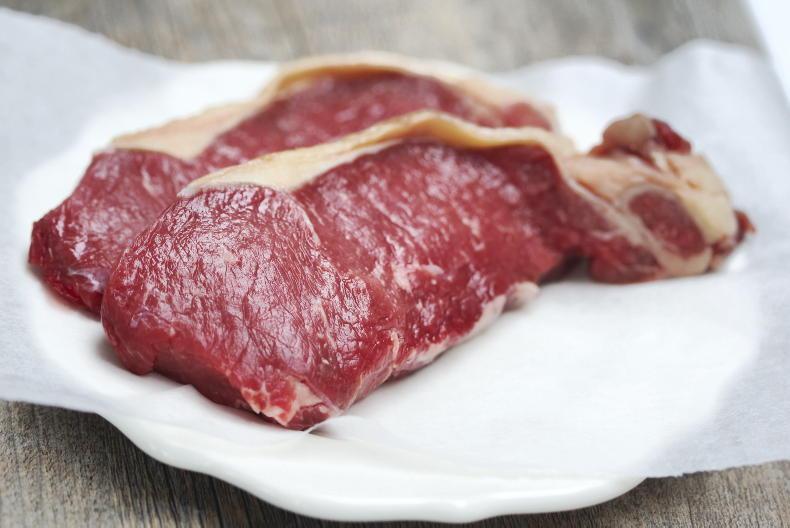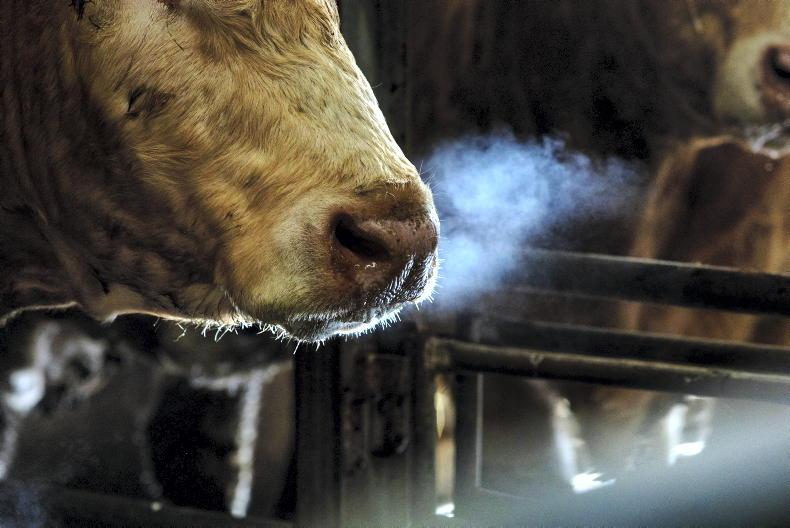Billed as the “Impossible Burger - made entirely from plants for people who love meat”, it’s a vegan burger but you can add cheese for a dollar.
I first saw the famous (or infamous) meatless burger in the farmer-owned Farmers and Distillers restaurant in Washington DC while on an Agricultural Science Association study tour last week. Three of our group members later wanted to try the Impossible Burger, but alas it was sold out.
Was this a reflection that stocks were low in the restaurant because there is no demand for the burger or because it was sold out due to high demand? I don’t know.
None of the American lobby groups we met showed any particular concern in relation to the rise of plant-based alternatives. The US National Farmers Union (NFU) believes that the burger is a soya product and soya farmers need outlets for their product too.
“Yes we have that on the menu. I wouldn’t recommend it but it’s made from soya so it’s supporting those farmers,” NFU boss Roger Johnson said.
Protein and labelling
The North American Meat Institute (NAMI) told the Irish Farmers Journal that with demand for protein set to increase by 50%, there is room for everyone in the protein market.
It also said that when genetically modified (GM) labelling law comes into effect next year, the consumers that seek out these meatless products because they believe they are “cleaner” foods could be taken aback when they realise they contain large number of ingredients and GM ingredients.
NAMI believes that the consumer who seeks out an alternative protein may also want a GM-free product and this will present a conundrum.
On cell-based protein or laboratory-grown meat, NAMI said: “You will pay $35 for a burger and you might feel good about it. However, it will never be cost-effective.”
Another potential issue is the labelling of lab-grown meat. Is it a meat or is it vegetable or is it a mix?
This is on the United States Department of Agriculture’s (USDA) radar at the moment. The labelling concerns stretch beyond meat alternatives though.
Perception
A spokesperson for the USDA told the Irish Farmers Journal that there is an internal argument within the organic industry about scale.
There is a perception among consumers that if they buy organic, they are buying from small suppliers. This may or may not be true, because organic products are grown at scale for efficiency like most other products.
In relation to meatless and alternative proteins, the USDA said it needs to help both meat and plant-based products. However, currently there is a lot of undefined terminology, which is problematic. The use of the term “natural” can be considered by consumers as organic, which is not the case. “Sustainable” is another one that causes confusion among the American consumers.
“Alternatives shouldn’t be an issue unless the labels misrepresent the product,” the USDA spokesperson said.
Gluten-free carrots
He also raised other questions. Should a bottle of water be labelled as non-GMO? Should a carrot be labelled gluten-free?
Should the government assume that consumers are intelligent and that they know that there is no gluten in carrots? This remains to be seen.
As consumers move further away from the farm gate, the importance of education is evident.
Read more
Bill Gates invests in plant-based Impossible Burger that ‘bleeds’
Bill Gates and Richard Branson invest in lab-grown 'clean meat'
Money flows into plant-based burger companies
Billed as the “Impossible Burger - made entirely from plants for people who love meat”, it’s a vegan burger but you can add cheese for a dollar.
I first saw the famous (or infamous) meatless burger in the farmer-owned Farmers and Distillers restaurant in Washington DC while on an Agricultural Science Association study tour last week. Three of our group members later wanted to try the Impossible Burger, but alas it was sold out.
Was this a reflection that stocks were low in the restaurant because there is no demand for the burger or because it was sold out due to high demand? I don’t know.
None of the American lobby groups we met showed any particular concern in relation to the rise of plant-based alternatives. The US National Farmers Union (NFU) believes that the burger is a soya product and soya farmers need outlets for their product too.
“Yes we have that on the menu. I wouldn’t recommend it but it’s made from soya so it’s supporting those farmers,” NFU boss Roger Johnson said.
Protein and labelling
The North American Meat Institute (NAMI) told the Irish Farmers Journal that with demand for protein set to increase by 50%, there is room for everyone in the protein market.
It also said that when genetically modified (GM) labelling law comes into effect next year, the consumers that seek out these meatless products because they believe they are “cleaner” foods could be taken aback when they realise they contain large number of ingredients and GM ingredients.
NAMI believes that the consumer who seeks out an alternative protein may also want a GM-free product and this will present a conundrum.
On cell-based protein or laboratory-grown meat, NAMI said: “You will pay $35 for a burger and you might feel good about it. However, it will never be cost-effective.”
Another potential issue is the labelling of lab-grown meat. Is it a meat or is it vegetable or is it a mix?
This is on the United States Department of Agriculture’s (USDA) radar at the moment. The labelling concerns stretch beyond meat alternatives though.
Perception
A spokesperson for the USDA told the Irish Farmers Journal that there is an internal argument within the organic industry about scale.
There is a perception among consumers that if they buy organic, they are buying from small suppliers. This may or may not be true, because organic products are grown at scale for efficiency like most other products.
In relation to meatless and alternative proteins, the USDA said it needs to help both meat and plant-based products. However, currently there is a lot of undefined terminology, which is problematic. The use of the term “natural” can be considered by consumers as organic, which is not the case. “Sustainable” is another one that causes confusion among the American consumers.
“Alternatives shouldn’t be an issue unless the labels misrepresent the product,” the USDA spokesperson said.
Gluten-free carrots
He also raised other questions. Should a bottle of water be labelled as non-GMO? Should a carrot be labelled gluten-free?
Should the government assume that consumers are intelligent and that they know that there is no gluten in carrots? This remains to be seen.
As consumers move further away from the farm gate, the importance of education is evident.
Read more
Bill Gates invests in plant-based Impossible Burger that ‘bleeds’
Bill Gates and Richard Branson invest in lab-grown 'clean meat'
Money flows into plant-based burger companies











SHARING OPTIONS